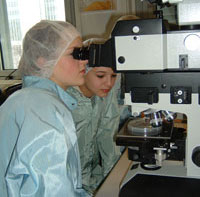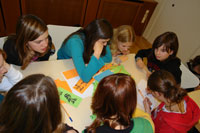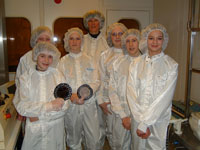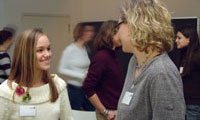CyberMentor: e-mentoring to strengthen interest and participation of girls in STEM Teach article
Germany, like many other European countries, has difficulties attracting women into science. Diana Schimke from the University of Ulm, is working improve matters by putting schoolgirls directly in contact with women scientists.

CyberMentor is a programme for German high-school girls to foster interest and participation in science, technology, engineering, and mathematics (STEM) by pairing them with professional women in STEM who can inform and advise them.
Why is a programme like CyberMentor important?
In Germany, few women study STEM subjects, in particular applied subjects such as electrical engineering, informatics and industrial engineeringw1. This is a loss not only for society, because there are fewer engineers and well-educated people in STEM, but also for the women themselves, who tend to take less secure and less well-paid positions in other fields.
Two possible reasons why girls choose not to study STEM are a lack of information about STEM career opportunities and the absence of suitable role models. To address both of these problems, we created the CyberMentor online community to bring together German high-school girls and professional women in STEM.
Description of the programme

Fraunhofer Institut IZM,
Munich, Germany
Image courtesy of Diana
Schimke
CyberMentor is an e-mentoring programme to foster interest and participation of high-school girls in STEM via the Internet. It provides suitable role models via mentoring, which involves a one-to-one relationship between women who work in the field of STEM (such as researchers, professors or engineers) and high-school girls. The girls communicate with their mentors via email.
Each high-school student (mentee) is paired with one female mentor who is working in STEM. They interact via email once a week over a period of 10 months. Topics range from private themes like “Do you have children?” to special scientific questions about the mentor’s work (“Can you explain what a Petri net is?”w2). Some mentees also ask for advice on homework or presentations that they have to prepare for school, or about study courses and what it is like to be a student in a male-dominated subject. Others are interested in the different study possibilities (university, college of higher education, corporate education) and which option their mentors chose. Each mentoring pair chooses their own topics and both mentoring partners can introduce themes they are interested in; in some cases, the mentee asks question after question, in other cases the mentor offers interesting themes for discussion. Handbooks with advice and guidelines on how to communicate are made available to both mentors and mentees. Besides emailing, some mentors arrange chat sessions with their mentees inside the CyberMentor community platform or offer to show them (and often other mentees as well) their workplace.
Besides the one-to-one communication between the members of each mentoring pair, participants can post questions to a discussion forum. From other mentees and mentors they get advice on schoolwork, possible jobs, staying abroad, internships and other topics the students are interested in. Having so many other students and mentors as contact persons offers a great possibility for information exchange. In the first year, for example, one girl didn’t know if she was able to study technical cybernetics and still be able to have a family some day. Instead of studying her favourite subject, she thought about choosing a typical female study course.
Several mentors answered and told the girl that it is possible to be an engineer and have children at the same time. They told her their own stories or stories from women they knew. A few months later the girl posted to the topic again and wrote that she has signed in for technical cybernetics and wanted to thank all the mentors for their advice.
Furthermore, CyberMentor offers personal pages for each member to introduce themselves, and a monthly journal, called CyberNews. CyberNews reports on interesting STEM articles, quizzes and interviews with female students talking about their study courses in STEM. Mentees and mentors can also submit their own articles. In addition to the virtual exchange, the CyberMentor programme arranges two to three face-to-face meetings, training sessions for mentors and workshops for mentees. The meetings allow mentees and mentors to get to know each other personally. Training sessions teach the mentors what is expected of them and offer advice on how to interact with the mentees. Workshops for mentees give them an insight into STEM topics and enable the girls to work together in teams to address interesting STEM topics. The workshops range from lab work at research institutes (e.g. Fraunhofer, Max Planck Institutes) to computer workshops at the University of Ulm. The workshops are often combined with online discussions in the CyberMentor forum and chat room.
Participation in the CyberMentor programme is free for both mentees and mentors. This includes all the meetings and workshops. Only transport and accommodation has to be covered by the participants. For some mentee workshops, sponsors from industry can be found and mentees do not have to pay for their transport.
How can I join?
The programme first started in September 2005 with about 100 mentoring pairs. The second, current, round started in September 2006 with 240 pairs. The next CyberMentor season starts in September 2007 and we plan to invite 300 new mentoring pairs into the programme. Mentors and mentees can apply now.
What do CyberMentor participants think about the programme?

workshop
Image courtesy of Diana
Schimke
The evaluation of the programme is not yet complete; first results suggest however, that interest in STEM and the willingness to participation in science is strengthened by active participation in CyberMentor. Mentors see the programme as a great chance for girls to learn about possible jobs in the fields of science, technology, engineering and mathematics.
I like the CyberMentor project because it offers female students an uncomplicated possibility to get to know STEM jobs and study courses. It shows the mentees many interesting fields of work and can create new interests or deepen existing ones. As a mentor, I can give an insight into my work, answer questions about studying and hopefully pass on a little enthusiasm. But mentors also benefit from the exchange: you get a different perspective on things.
Cornelia Beck, PhD student, University of Ulm
I think CyberMentor is a fantastic programme because it covers a wide variety of needs. A girl who is finishing school and doesn’t know where to study can get professional advice, as can a girl who wants to know if a science career can be combined with a family. Also younger girls learn about STEM topics by exchanging with mentors or older students and by participating at workshops and in teams. This I believe is especially important. Many approaches to get girls interested in STEM careers are introduced too late. Informative meetings about science for female students who are about to graduate reach only very few students – most have already decided “STEM is not for me”, but often it would have been had they received more information at an earlier stage. CyberMentor offers the possibility to get to know science early and through a positive approach.
Birgitta König-Ries, Professor of Computer Science, University of Jena

mentor Sabine works, the
girls learned about radio-
frequency identification and
visited, for example, the
clean room, where they could
practice wafer handling
Image courtesy of Diana
Schimke
I was convinced by this mentoring programme right away. It is important to show girls that they do not have to choose ‘typically female’ jobs, but that they can choose different careers too. Especially in STEM, girls often think they are not good enough or if they are, they are still not interested. I think CyberMentor is a great possibility to show girls that STEM subjects and STEM jobs can be awesome too and that there is room for them. Maybe this programme will help to ensure that someday it will be normal that there are as many women as men in leadership positions, in research and in industry.
Marlies Kepp, industrial engineer, Trumpf GmbH + Co. KG, Ditzingen
I am totally amazed by CyberMentor! You can exchange messages about all different kinds of topics, you get to know new people and you can ask them anything about STEM or personal themes. Furthermore there are competitions and projects to participate in and you get to go on trips and visit institutes you otherwise would not be able to visit (e.g. Fraunhofer IZM, Munich). You learn about new and interesting topics, get to know new people and have lots of fun!
Tanja (Year 8)
CyberMentor offers the possibility to learn new and interesting things about STEM. I often feel that what is offered in school is not enough for me. I like to get involved in different topics and to exchange ideas with mentors and other students. Furthermore I think it is an interesting and exciting chance to communicate with like-minded people and to learn more through this.
Angela (Year 11)
Mentees
Any girl in Years 6-13 (ages 12-19) at a German school who is interested in STEM can apply to be a mentee. On the online application form, specify which STEM topics you are most interested in and we will try to find a suitable mentor for you. Every girl who applies is assigned a mentor, although late applicants may have to wait until the following academic year.
To join the next CyberMentor season (starting in September 2007), apply soon so that we can guarantee you one of the 300 mentors. For more information, visit the CyberMentor websitew3.
Mentors

know each other personally
at a CyberMentor meeting
Image courtesy of Diana
Schimke
We are looking for women working in STEM fields (such as teachers, industrial scientists, engineers, researchers, professors and so forth), within and outside Germany, to be mentors. We expect mentors to offer 10 minutes a week to stay in contact with their mentees. This can be more if you are discussing interesting topics or less in cases of vacation or business trips, of course.
You need to understand German to be able to read our newsletters for mentors but if you prefer, you can communicate with your mentee in English. For more information, visit the CyberMentor websitew3.
Schools
The CyberMentor team are happy to visit German schools to present the project to students of all ages. To request a visit or receive an information pack for schools and students, email cybermentor@uni-ulm.de.
Who runs CyberMentor?
CyberMentor is a non-profit programme organised by the University of Ulm, Germany. The administrators are the psychologists Dr Heidrun Stoeger and Professor Albert Ziegler. Diana Schimke is a computer scientist and works full-time for the programme. She is supported by Iris Woersdoerfer, a research assistant who is studying computer science. The programme is financed by the German Ministerium für Ernährung und Ländlichen Raum (Ministry for Nutrition and Rural Areas) and the University of Ulm.
If you would like to know more about the programme or get advice about setting up a similar project in your own country, please contact Diana Schimke (diana.schimke@uni-ulm.de) or visit the CyberMentor websitew3.
Web References
- w1 – More details of the gender difference at university are available in the report In the Spotlight: Women in Germany 2006 which can be downloaded here.
- For an European comparison of women in industrial research, see the EU report Women in Industrial Research – speeding up changes in Europe which can be downloaded here.
- w2 – What is a Petri net?
- w3 – The CyberMentor website
Review
This project is a good idea, and the article can provide a stimulus for a discussion about the problem of a declining interest in science in younger generations of Europeans.
Isabella Marini, Italy





